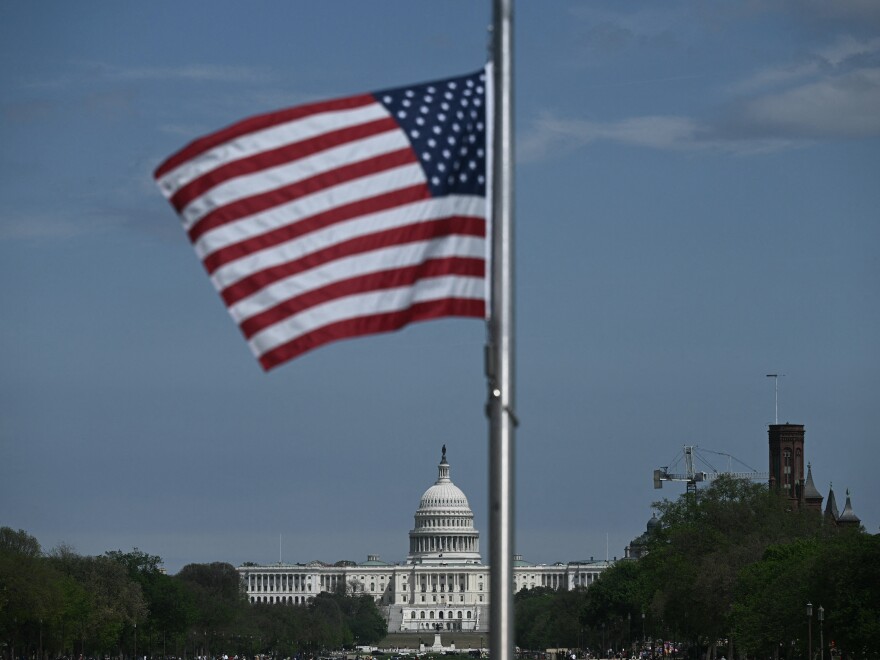Good morning. The Up First newsletter is what you’re reading.Listen to the Up First podcast for all the news you need to start your day, and subscribe here to get it sent to your inbox.
Today’s top stories
For an early start to their yearly August recess, House Speaker Mike Johnson is sending members home today.He wants to keep Republicans from getting into a heated argument about the disclosure of information about FBI investigations into Jeffrey Epstein. Supporters of President Trump, who was formerly pals with Epstein, are criticizing him and calling for additional details. He has described the commotion as an apolitically driven “witch hunt” that diverts attention from his goals. While they’re away, Republicans hope the debate will go away, but others don’t think it will.
-
“It is pretty rare to see the House floor paralyzed like this, even for a day,”
NPR’s Claudia Grisales tells
Up First
. The extended recess leaves House Republicans with tight deadlines for critical legislation once they return in September. Trump has said related grand jury files will be released, but some Republican voters say they want the administration to do more. Rep. Thomas Massie, R-Ky., is leading a bipartisan petition that could force a vote to release the Epstein records. Massie says he believes Americans want to see justice and transparency, and, when they return in September, itwill become a problem for
Johnson and Trump.
Trump sidestepped inquiries regarding the Epstein issue yesterday, instead directing attention to a long-standing dispute: Russian meddling in the 2016 U.S. presidential election. This follows last week’s announcement by Tulsi Gabbard, the director of national intelligence, that she had made proof of intelligence manipulation by former President Barack Obama and his national security officers against Trump. Nearly 100 pages of recently declassified Obama-era emails from before and after the 2016 election are among the materials made public.
-
Many of the emails focused on whether Russian hackers had or could successfully hack the election
, says NPR’s Jenna McLaughlin, who read through the documents. The Obama administration’s national security officials said it was unlikely Russian hackers could breach election infrastructure on a large scale without detection. After Trump won the 2016 election, Obama asked intelligence officials to write an assessment on everything they knew about Russian interference in the election cycle. The report never stated that Russia hacked the election, but did state that Russiaattempted to influence the election
using tactics such as disinformation on social media and bot farms.
More than seventy Columbia University students are facing disciplinary action after taking part in a pro-Palestinian demonstration at the Butler Library in May.Probation, suspensions, expulsions, and degree revocations are among the disciplinary measures. Over two-thirds of the pupils received expulsion or suspension. The action was taken as university representatives are still negotiating an agreement with the Trump administration to unlock research funding that has been stalled. According to them, the grants totaling almost $1 billion are frozen.
-
The disciplinary actions are significant because the Trump administration is paying attention to how universities handle protests
as part of their efforts to combat antisemitism on campus, says Jessica Gould of NPR network station WNYC. Columbia’s Acting President Claire Shipman states that the university is working to make improvements to the campus climate, and the fact that they are facing pressure from the governmentdoesn’t make the university’s problems less real
. Many Jewish and Muslim students at the university have said they have faced harassment since the Oct. 7, 2023, Hamas attacks on Israel.
Life advice
It can be challenging to stick to the rule of just purchasing necessities rather than wants. It’s acceptable to occasionally give in to your desires, but the important thing is to be deliberate. This life kit guide can help you make a thoughtful choice you won’t regret if you’re not sure whether to swipe that card or walk away.
- Hold off on spending if you have to pull funds you set aside for basic needs. Don’t take money from your emergency fund or money saved for vacations.
- When feeling spendy, use the acronym HALT to check in on yourself. Are you hungry, angry, lonely or tired? If so, there could be another way to fill your need.
- Before buying, shop around for the best price and read reviews to make sure you’re getting the best bang for your buck.
- If you are buying the latest and greatest in an attempt to achieve status, consider why that item matters so much to your self-esteem.
Listen to this episode of NPR’s Life Kit for additional tips on how to shop with awareness. For professional guidance on relationships, finances, love, and other topics, sign up for the Life Kit newsletter.
Kitisnow’s life on Instagram. For brief excerpts of its programs on relationships, health, money, and other topics, follow the page. Recent entries include feel-good exercises for achy, painful feet, a cartoon on how to step in when someone is being bullied or attacked, and a reel on how to correctly apply mosquito repellant. Keep an eye out for chances to offer your own guidance to the Life Kit audience.
Picture show
Earlier this year, Roland Reisley turned 101. He prefers to boast about something other than his exceptional health. He is proud to still be residing in the house that renowned architect Frank Lloyd Wright created for him. Nestled in the woodlands of Westchester County, New York, this home has been the home of Reisley for 73 years. Usonia is a mid-century modern community with 47 buildings. Wright saw Usonia as a site where middle-class Americans might build stunning, reasonably priced homes that were connected to the outdoors. Built with local materials, the house has concrete floors, wood paneling, built-in shelving, a carport, a flat roof, and handcrafted furniture.Now on the National Register of Historic Places, explore the interior of the mansion.
3 things to know before you go
Suzanne Nuyen edited this newsletter.
Copyright 2025 NPR






